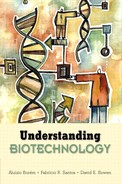How does society make decisions about new and controversial technologies, like genetic engineering? Who should make those decisions? How should the public be informed about the benefits and risks? These questions barely existed a generation ago. Now, they are central to any discussion about innovation, especially biotechnology and genetic engineering.
No matter how you feel about biotechnology, understanding its basic principles, fantastic potential, and very real risks is essential if you want to have a positive impact on today's public debate. Of course biotechnology is an ancient science, first practiced by people who selected which plants to save, which livestock to cross, which fermented juices to drink. But the fact that biotechnology has been around for a very long time misses the point. Traditional biotechnology reflected the limited impact that people could have on themselves and their environment (ignoring, for the moment, the profound impact of agriculture itself). Modern biotechnology, primarily those technologies made possible by genetic engineering and gene cloning, is both quantitatively and qualitatively different. Given the public's recent experience with the interface between biology and public policy—the Green Revolution, the “War” on cancer, even the government's response to Mad Cow Disease—it is hardly surprising that there is great excitement, great caution, and also great ignorance about biotechnology and the ways it may help or hurt people and the environment.
Some areas of concern about biotechnology are real, no matter what its defenders may say. Ethical conflicts over animal (not to mention human) cloning, deciding who should have access to a person's genetic information, the likelihood that genetically modified fish will escape into the environment and alter the genes in native fish populations; these are not fantasies. The accelerating loss of biodiversity in our food crops as more varieties come from a smaller number of sources, the growing role of life science corporations and their passion for intellectual property protection of genes and genetic products, the disruption in the lives of organic farmers whose crops are fertilized by genetically modified pollen they do not want—these are profoundly difficult challenges for society to understand, let alone rectify.
Yet the benefits of biotechnology are even more compelling. To ignore them would be a mistake of unparalleled magnitude. Biotechnology can reduce the levels of hazardous chemicals released into the environment. Farmers already benefit from this, because they now enjoy a working environment that is far less hazardous. Biotechnology can produce food with better nutrition and novel health-promoting compounds. People in less developed countries may soon be eating fruits and vegetables that produce vaccines to some of the world's most intractable human diseases. Indeed, higher yielding crop varieties not only feed more people, they do so on less land, reducing the stress that agriculture puts on limited land and water resources. Biotechnology has already led to the invention of better diagnostic tools in human medicine. Soon, it will yield new cures for genetic diseases, cancer, heart disease, autoimmune syndromes, even Alzheimer's and other degenerative problems.
Developing a public consensus about biotechnology is a responsibility for everyone in society, not just large corporations and anti-technology activists. Understanding Biotechnology is an important and timely book that provides the information and insight to enable readers to participate in the biotechnology debate. Some will read this book and go on to become genetic engineers. Others will read this book and go on to become lawyers, business leaders, journalists, or just better informed citizens. No matter what your motivation for learning more about biotechnology, your knowledge about this subject and your commitment to participate in the public dialogue are essential. Understanding Biotechnology will give you the tools you need to participate in this important debate.
Nevin Dale YoungUniversity of MinnesotaSt. Paul, Minnesota
